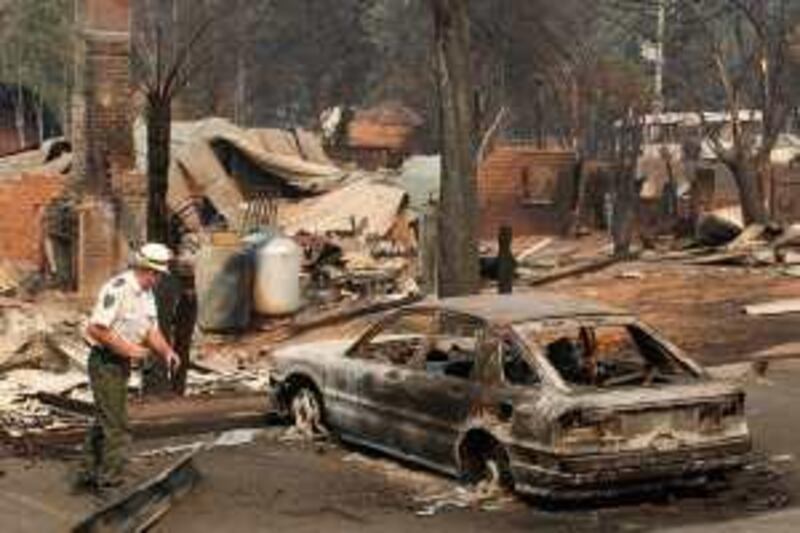SYDNEY // Australia is counting the cost of its most devastating bush fire disaster as the death toll climbed above 160 yesterday in outbreaks that raged across the southern state of Victoria. Entire communities have been obliterated by walls of flame several storeys high, propelled by red-hot winds that tore through countryside dried by years of drought as temperatures soared to 47 degrees Celsius.
To add to the loss of life, churches, police stations, supermarkets and at least 750 homes have been reduced to piles of ash, littered with twisted metal roofs, while charred chimney stacks stand like tombstones over the scorched earth. Arsonists, who are thought to have been responsible for at least two of the most ferocious outbreaks in Victoria, have been accused of unspeakable crimes by the Australian prime minister, Kevin Rudd.
"What do you say about anyone like that? What do you say? I don't know. There's no words to describe it other than it's mass murder," said Mr Rudd, who fought back tears during a television interview. Wildfires are a regular feature of Australia's warm summer months, but the scale of the tragedy - there are estimated to be around 400 blazes - has numbed a battle-hardened country that is used to nature's extremes. Dozens of people remain unaccounted for and investigators are concerned about what they might find in the charred remains of homes and cars. Cooler weather has helped the emergency effort, while New Zealand has offered to send firefighters to relieve exhausted crews in Australia's beleaguered south and the British prime minister, Gordon Brown, said his government was also ready to help. The Australian Red Cross, which has about 400 volunteers in Victoria, is also assisting in the aid effort and has appealed for donations. There will be a lengthy and exhaustive period of reflection as Australia digests the trauma of this unprecedented event and seeks to understand the reasons behind it and ways to prevent such a calamity happening again. Australia's attorney general, Robert McClelland, said the country must consider how effective its response to the bush fire threat has been. "We really do need to look at our early-warning systems, whether those early-warning systems are adequate and whether they can be enhanced on a national basis," Mr McClelland said. The advice usually given to residents is either to get away early and leave their property in the hands of fate or stay and protect their home. Such guidance is now being questioned, given that many of the victims died in their houses, while others who had decided to escape the onslaught were killed in their cars. "People did stay and they did survive," said Ross Williamson, a senior firefighter. "People made decisions on the best advice but this was a catastrophic fire. It was an absolute holocaust. These have been absolutely tragic fires, the worst I've ever seen." Amid the pain, there has been heroism. Fire crews risked their lives to save two men who had gone to help their father try to beat back flames that had engulfed his farm north of Melbourne, the Victoria state capital. "When we got there, we just heard this roar," said Gary, who would not give his surname. "We thought it was a helicopter, but it was the roar of the bush going up. All the trees were alight. What got us was the wind driving the fire through the trees in front of us. "The heat was horrific in my throat; there was soot in the air," he said. With his father's house ablaze, emergency workers arrived and risked everything to make sure Gary and his relatives escaped the inferno. "We've jumped into the fire truck and all the fire shields were down on the windows and it got to the stage where the truck ran out of water and the crew was screaming out 'Mayday' on the radio," Gary said. "The driver was crying. Then they said we've got to make a run for it and we couldn't see the road in front of us and even the white road lines were on fire, but somehow we made it out. "We saw a bit of grey ahead of us and didn't realise it was daylight. All of a sudden there was daylight out of all that black." Darkness, however, still envelops the lives of many, not least those who lie in hospital with near-fatal burns to most of their bodies, and residents unsure if family members have survived. Evacuation centres in small Victorian towns have been overwhelmed by dazed locals wrapped in blankets asking after missing relatives, while the Red Cross has compiled a register of residents who have not been found. "We have to think of people who have suffered tremendous loss," said Mary Lalios, the mayor of Whittlesea, which lies near the small town of Kinglake, where many people perished. "Our hearts and our prayers go out to them. There are people who just don't know if loved ones are still alive." Forensic teams from across Australia are heading to Victoria to help identify the victims. The team is part of a national disaster plan designed to respond to a terrorist attack. pmercer@thenational.ae Australian expatriates concerned for the welfare of family or friends may seek information on the bush fires, including regular updates, through Victoria's Country Fire Association website, www.cfa.vic.gov.au





